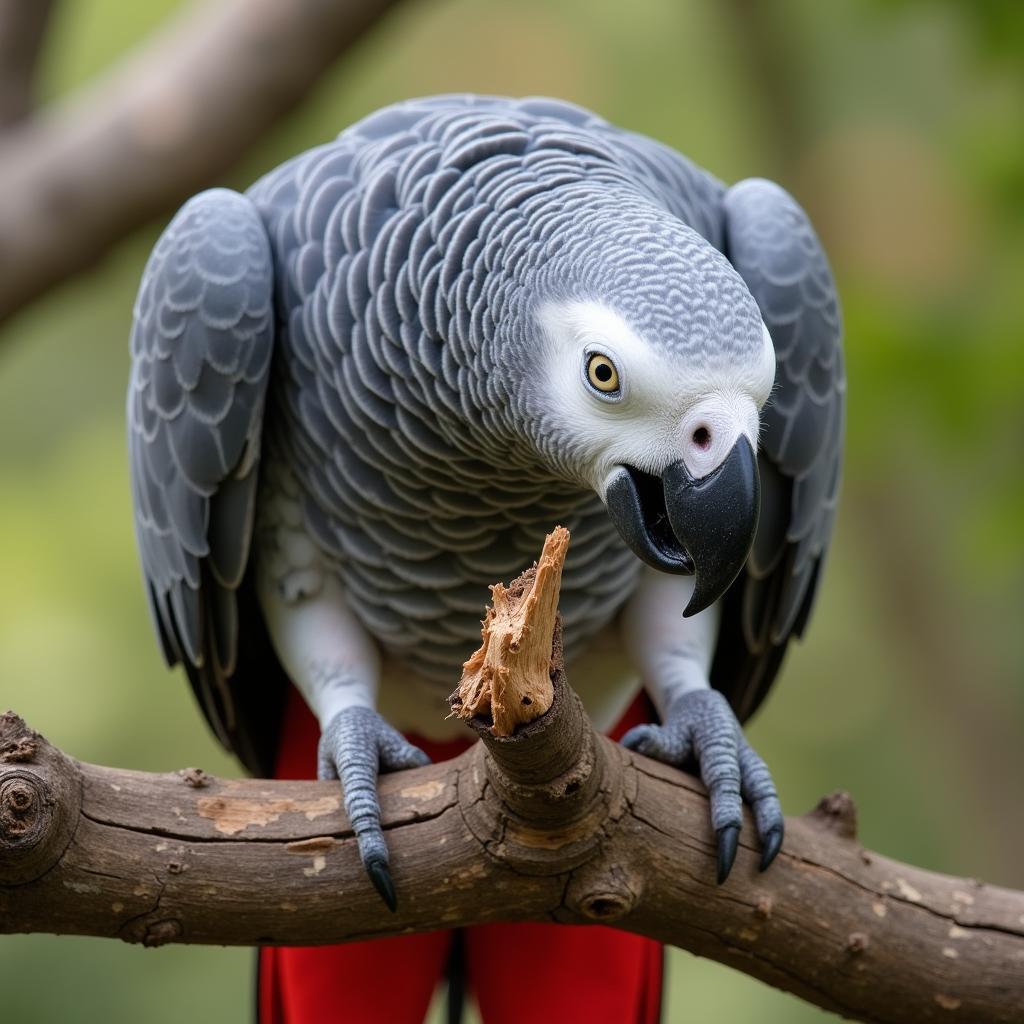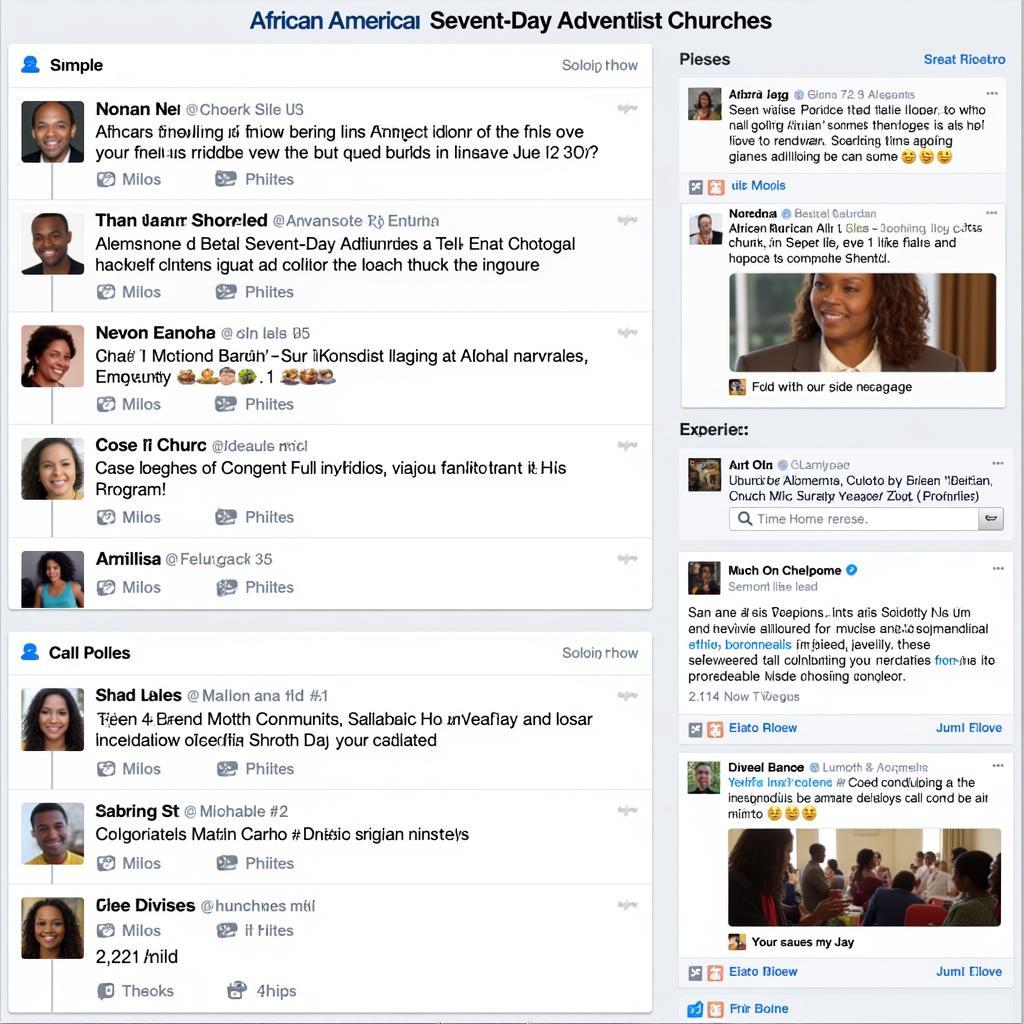Why Does My African Grey Chew Wood?
African grey parrots, renowned for their intelligence and talking abilities, are fascinating creatures with specific needs. One such need, often perplexing to owners, is their inherent desire to chew wood. This behavior, far from being destructive, is actually crucial for your feathered friend’s well-being.
 African Grey Parrot Chewing on Wood
African Grey Parrot Chewing on Wood
Natural Instincts and Beak Health
In their natural habitats across central and western Africa, African greys spend a significant portion of their day gnawing on branches, bark, and even fruit trees. This constant chewing serves several vital purposes. Firstly, it helps to wear down their beaks, which grow continuously throughout their lives. Without proper wear, an overgrown beak can lead to feeding difficulties and other health issues.
Secondly, chewing on wood provides these parrots with essential mental stimulation. Just as puzzles and games engage our minds, chewing challenges their beaks and brains, keeping them entertained and mentally sharp. This is especially crucial for intelligent birds like African greys, who thrive on mental enrichment.
Dietary Supplements and Foraging Behavior
While not a primary source of nutrition, chewing wood can also offer some dietary benefits to African greys. The bark and wood of certain trees contain trace minerals and nutrients that can supplement their diet. Moreover, the act of chewing itself mimics natural foraging behaviors, satisfying their innate instincts to search for food and explore their environment.
Choosing Safe and Stimulating Chew Toys
african grey toys are essential for replicating this natural behavior in a domestic setting. When selecting chew toys for your African grey, opt for those made from natural, untreated wood. Avoid wood treated with chemicals or pesticides, as these can be toxic to birds. Variety is key! Offer a selection of toys with different textures, sizes, and shapes to keep your parrot engaged and prevent boredom.
Recognizing Signs of Chewing Problems
While chewing wood is a natural and healthy behavior for African greys, excessive or destructive chewing can sometimes indicate underlying issues. If you notice your parrot chewing on furniture, cage bars, or other inappropriate items, it could be a sign of boredom, stress, or nutritional deficiencies.
Addressing Excessive Chewing
Provide plenty of stimulating toys and rotate them regularly to prevent boredom. Ensure your parrot is receiving a balanced diet that includes fresh fruits, vegetables, and a high-quality pellet formula. Create a stress-free environment by providing ample space, a regular routine, and plenty of interaction and playtime with you. If you are concerned about your parrot’s chewing habits or suspect a medical issue, consult with an avian veterinarian for a proper diagnosis and treatment plan.
Conclusion
Understanding why your African grey chews wood is essential for providing proper care and ensuring their well-being. By providing safe and stimulating chew toys, you can satisfy their natural instincts, promote beak health, and enrich their lives in captivity. Remember, chewing wood is not just a behavior but a fundamental need for these intelligent and engaging creatures. By embracing this natural instinct, you can help your African grey thrive in your care.
FAQs
1. What kind of wood is safe for African greys?
Untreated wood, such as apple, willow, pine (kiln-dried), and aspen, is generally safe for African greys. Avoid wood from fruit trees that have been sprayed with pesticides.
2. How often should I replace my parrot’s chew toys?
Inspect your parrot’s chew toys regularly and replace them once they show signs of wear and tear, such as splintering or becoming too small.
3. Can I give my African grey branches from my backyard?
It’s best to avoid giving your parrot branches from your backyard unless you’re certain they haven’t been treated with pesticides or herbicides.
4. My African grey is chewing on its cage bars. What should I do?
Chewing on cage bars can be a sign of boredom, stress, or nutritional deficiencies. Try providing more stimulating toys, a larger cage, or adjusting their diet. Consult with an avian veterinarian if the behavior persists.
5. What are some other signs of boredom or stress in African greys?
Other signs include feather plucking, excessive screaming, aggression, and lethargy.
Need more help? Contact us at +255768904061, email us at kaka.mag@gmail.com, or visit us at Mbarali DC Mawindi, Kangaga, Tanzania. Our customer service team is available 24/7. You can also find more information on african grey parrot care videos, african grey cage india buy, african grey parrot stand, and african grey nest box for sale.

